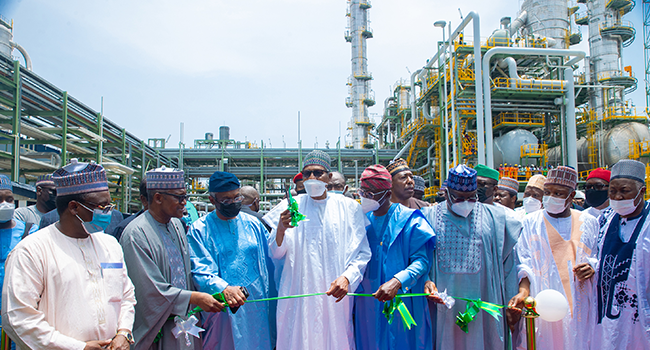
Nigeria's President, Muhammadu Buhari, inaugurated an oil facility touted as Africa's biggest oil refinery on Monday, marking the completion of a project that faced significant delays. The commissioning occurred just a week before President Buhari's term came to an end.
Africa's wealthiest individual, Aliko Dangote, has constructed an oil facility in Lagos, Nigeria, set to be the largest oil refinery on the continent. Despite experiencing several delays, the refinery is scheduled to commence operations in June, with the first products projected to hit the market by August, although some analysts suggest a later timeline is possible.
Upon reaching full capacity, the refinery will have the capability to process 650,000 barrels per day, as reported by the company. President Buhari, who concludes his eight-year tenure on May 29, hailed the project as a significant milestone and a transformative force for Nigeria's downstream petroleum products market and the entire African continent.
During the commissioning, the presidents of Ghana, Niger, Togo, Senegal, and a representative of the Chadian leader were in attendance. Dangote stated that the refinery aims to meet Nigeria's domestic demand while also serving global markets. He anticipates that once the plant is fully operational, at least 40 percent of its capacity will be available for export, resulting in a substantial influx of foreign exchange into the country.
Nigeria, with its large population and significant crude oil production, has historically relied on fuel imports to meet local demand due to underperforming state-run refineries. The country swaps billions of dollars' worth of crude for subsidized gasoline, which has put a strain on foreign exchange reserves amid declining oil revenues caused by the COVID-19 pandemic and the Russia-Ukraine conflict.
Analysts have varying expectations regarding the refinery's timeline. Tunde Leye from SBM Intelligence consultancy believes it may not be fully operational before the end of 2024, while Amaka Anku, Eurasia Group's Africa head, is more optimistic, suggesting full operations could be achieved by the end of the year or next year.
Both analysts agree that while Dangote's refinery may not lead to cheaper petroleum products, it presents an opportunity for the government to eliminate costly subsidies and address revenue shortfalls. Anku believes it is a significant chance for the government to fulfill its goal of subsidy removal, but it requires a political decision.
The refinery could also contribute to improved transparency in the oil sector. As a publicly listed company, Dangote will publish information about its crude oil purchases and petroleum sales, which represents an improvement over the current lack of transparency in the industry. This opacity has fostered corruption and restricted the government's ability to invest in crucial sectors like education and healthcare.
Situated in the Lekki Free Zone on a vast expanse of 2,635 hectares (6,500 acres), the refinery was initially estimated to cost $9 billion but ultimately incurred expenses of approximately $18.5 billion to complete. Additionally, over 1,100 kilometers (680 miles) of subsea pipelines have been laid to connect the oil-rich Niger Delta to the complex. These pipelines are expected to facilitate the evacuation of trapped gas from offshore platforms and enable its monetization.
Within the extensive complex, a $2 billion fertilizer plant with a yearly capacity of three million tonnes has also been constructed. The project is anticipated to generate over 100,000 direct and indirect employment opportunities, as reported by the Lagos State government.
Copyright © ENTREPRENEURSHIP DEVELOPMENT INSTITUTE 2015. All rights reserved.
Powered by: C.B.N